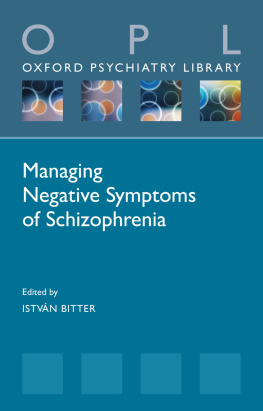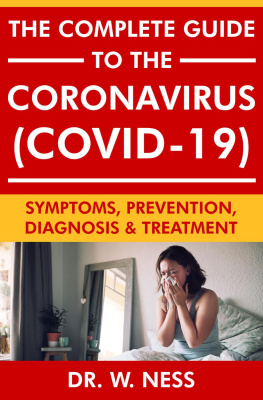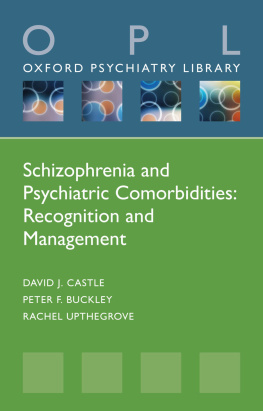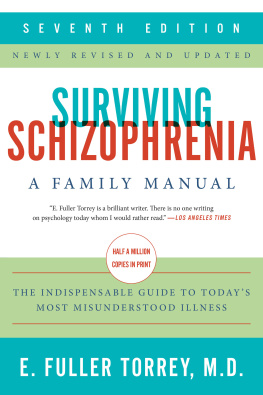
Managing Negative Symptoms of Schizophrenia

Great Clarendon Street, Oxford, OX2 6DP,
United Kingdom
Oxford University Press is a department of the University of Oxford.
It furthers the Universitys objective of excellence in research, scholarship, and education by publishing worldwide. Oxford is a registered trade mark of Oxford University Press in the UK and in certain other countries
Oxford University Press 2020
The moral rights of the authors have been asserted
First Edition published in 2020
Impression: 1
All rights reserved. No part of this publication may be reproduced, stored in a retrieval system, or transmitted, in any form or by any means, without the prior permission in writing of Oxford University Press, or as expressly permitted by law, by licence or under terms agreed with the appropriate reprographics rights organization. Enquiries concerning reproduction outside the scope of the above should be sent to the Rights Department, Oxford University Press, at the address above
You must not circulate this work in any other form and you must impose this same condition on any acquirer
Published in the United States of America by Oxford University Press
198 Madison Avenue, New York, NY 10016, United States of America
British Library Cataloguing in Publication Data
Data available
Library of Congress Control Number: 2019957196
ISBN 9780198840121
eISBN 9780192576521
Oxford University Press makes no representation, express or implied, that the drug dosages in this book are correct. Readers must therefore always check the product information and clinical procedures with the most up-to-date published product information and data sheets provided by the manufacturers and the most recent codes of conduct and safety regulations. The authors and the publishers do not accept responsibility or legal liability for any errors in the text or for the misuse or misapplication of material in this work. Except where otherwise stated, drug dosages and recommendations are for the non-pregnant adult who is not breast-feeding
Links to third party websites are provided by Oxford in good faith and for information only. Oxford disclaims any responsibility for the materials contained in any third party website referenced in this work.
Foreword
Schizophrenia has a worldwide prevalence of between 0.4 per cent and 1.4 per cent. Out of this group of patients up to 90 per cent experience negative symptoms. Negative symptoms have been recognized as key components of schizophrenia since the first descriptions of this mental disorder by Emil Kraepelin and later on by Eugen Bleuler. About 2030 per cent of these patients show several domains of negative symptoms characteristic for this group, having an increased risk for enduring symptomatology and unfavourable outcome. However, the progress in the development of innovative treatments has so far been slow and negative symptoms represent an unmet need in the care of subjects with schizophrenia.
This has triggered a growing interest in this sub-syndrome of schizophrenia, undermined by the evidence of the strong relationship of negative symptoms with low remission rates, poor real-life functioning, and quality of life. In the light of the strong impact on functional outcome and the burden on patients, relatives, and healthcare systems, negative symptoms have become a key target in the search for new therapeutic tools. It is therefore imperative to focus on the conceptualization, descriptions, and treatment of negative symptoms. Managing Negative Symptoms in Schizophrenia does exactly that: the authors of this book pay particular attention to the contemporary research into negative symptoms, which has produced many interesting new findings. However, the interpretation of these new findings has been controversial, and this book devotes particular attention to the inclusion of the varied views of different research groups on current issues about negative symptoms in schizophrenia, with opinions partly corresponding to but also showing a rich diversity in their views. Istvn Bitters primary ambition during the writing and editing of this book was to focus on real-world patients and to present material which can help improve the care for patients with negative symptoms of schizophrenia. The authors of this book have accomplished this task in an exceptional way.
Peter Falkai
Munich, December 2019
Preface
Recent years have witnessed an increased interest in negative symptoms, which have been considered to be the fundamental or core symptoms of schizophrenia. Contemporary research into negative symptoms has produced new findings; however, their interpretation has been controversial. This book devotes particular attention to the inclusion of the views of different research groups on current issues in this field.
The chapter contributors to this book present a variety of opinions about negative symptoms in schizophrenia. Whilst these opinions are partly corresponding, we can find a rich diversity in their views, including, but not limited to, answers to the following questions: which signs and symptoms belong to the negative symptom domain in schizophrenia? How can we differentiate primary negative symptoms of schizophrenia from the clinically identical secondary negative symptoms which are associated, for example, with other mental disorders (e.g. substance use), with other symptoms of schizophrenia (e.g. depression), with social isolation, and with poverty (e.g. lack of opportunities)?
Current research is focusing on primary persistent negative symptoms, even though negative symptoms are very rarely present in schizophrenia without other symptoms (e.g. positive symptoms, anxiety, depression, extrapyramidal symptoms). Despite the frequent coexistence of these symptoms, their relationship, and especially their long-term association, has rarely been the subject of research. Most of the scales on negative symptoms are based on observer rating. The patients self-assessments and self-experiences (including the so-called basic symptoms) have been vastly overlooked both in research and clinical work. The individual signs and symptoms are of utmost importance in the search for biological markers. Total scores of negative symptom scales are useful in clinical studies measuring changes of the severity of symptoms from baseline to endpoint. However, reducing multiple items/symptoms to a single score is associated with loss of valuable information, which may be essential for research into the pathophysiology and aetiology of schizophrenia.
The above mentioned topics and questions have been addressed in this book along with the current consensus on the five domains of negative symptoms. The different viewpoints and constructs described by the chapter contributors are complementary rather than exclusive. Their knowledge helps to improve the diagnosis and treatment of negative symptoms and contribute to the progress of research in this field.
The two chapters in this book that focus on the treatment of negative symptoms in schizophrenia support clinical practice with evidence-based recommendations both for pharmacological and psychosocial treatments. We have been stricter with recommending pharmacological treatments than psychosocial therapies, as the benefitrisk ratio is questionable or even unfavourable for some off-label pharmacological treatment attempts reported in the literature. Whilst some of them merit further research, we definitively would not like to encourage treatment practices without sufficient evidence for a favourable benefitrisk ratio.












